Screenshot of Tuesday’s special Eureka Council meeting.
###
At a special meeting on Tuesday, the Eureka City Council considered potential changes to two ordinances that restrict unauthorized homeless encampments and loitering in public spaces.
After more than three hours of staff presentations and at-times fervent public comment and discussion, the city council directed staff to consolidate the Camping Ordinance and the Sitting or Lying on Sidewalks Ordinance into a single, simplified ordinance with “more teeth.” The proposed changes would give staff “more tools” to address homelessness and allow the Eureka Police Department to increase enforcement of the ordinance by upgrading penalties from an infraction to a misdemeanor.
The push to streamline the city’s homeless ordinances comes in response to the U.S. Supreme Court’s 2024 Grants Pass v. Johnson decision, which gave cities more power to cite, fine and arrest people for sleeping in public spaces. The ruling effectively overturned the Ninth Circuit’s Martin v. Boise decision, issued in 2018, which held that local governments cannot punish someone for sleeping outside.
Appearing via Zoom, Eureka City Manager Miles Slattery explained that the city attorney’s office reviewed the two ordinances after the recent Supreme Court ruling and determined both documents were “in need of a lot of revision.”
“[The ordinances are] very much similar in certain ways and we felt as though those two needed some revision based on past practices and what we’re currently doing,” Slattery explained. “We felt it would also be a good time to provide an update on our Homeless Action Plan, which is related to this, and go over the milestones associated with that.”
Over the course of the next hour and a half, the city council received detailed presentations on the city’s current enforcement efforts around quality-of-life issues stemming from homelessness. City Attorney Autumn Luna, EPD Sgt. Jon Omey, Managing Mental Health Clinician Jacob Rosen and Special Program Manager Jeff Davis each addressed the council.
Luna’s presentation largely focused on the history of Eureka’s homeless ordinances and the council’s decision in 2021 to shift to an “infraction-only model” per Martin v. Boise.
“The effect of that ruling was pretty profound,” she said. “We removed the ability to issue misdemeanor citations and prosecute on a misdemeanor basis. The only violation of the no-camping ordinance right now is a monetary fine, and there are a couple of tiers of that monetary fine but they’re all relatively low.”
Omey, who leads EPD’s Community Safety Engagement Team (CSET), said the enforcement actions allowed under the city’s current ordinance limit the department’s ability to “help people overcome homelessness.”
“Based [on] my experience, most individuals we contact at camps voluntarily comply,” Omey said. “They’ll pack up when we let them know about a complaint or whatever the problem is. However, there is a small percentage of individuals … who refuse to comply in those situations. … [T]here does come a point where we have to balance the needs of the community with the needs of the environment [and] the needs of the actual individual who’s failing to comply.”
Rosen’s presentation focused on the city’s approach to treatment and the importance of balancing accountability and enforcement while “promoting compassion at the same time.” One such tool is the city’s Law Enforcement Alternative Diversion (LEAD) program, which redirects people at risk of arrest to community-based services instead of jail. The program launched in 2020 but never gained traction, Rosen said.
“As you can imagine, between some difficulties with not having a ton of teeth to it, combined with this thing called COVID … it didn’t take off,” Rosen said. “[W]e are interested in re-implementing [the program], particularly if the option the council chooses is to move forward with escalat[es] the infraction to a misdemeanor because that would add the teeth that are needed to gain some of that motivation to help folks.”
Increasing penalties from an infraction to a misdemeanor would increase accountability, Rosen said.
“[D]eveloping the LEAD program locally would really enhance [EPD’s] ability to both collaborate with CARE [Crisis Alternative Response Eureka] as well as Uplift and get folks connected when they have anosognosia or their substance use disorder is preventing them from developing insight into their situation,” he continued. “It’ll really add that tool that we need to be able to work with individuals who are treatment-resistant, who are not otherwise engaging.”
Davis, who oversees the Community Access Project for Eureka (CAPE) and Uplift, provided an update on the city’s Homeless Action Plan and progress made in addressing the local homelessness crisis. In the last two years, the city has made tremendous strides in increasing its sheltering capacity and rehousing individuals, Davis said.
“We’ve housed over 200 people through our rapid rehousing program,” he said, adding the city is getting ready to open the Uplift Eureka Community Resource Center at the Municipal Auditorium. The city is also getting ready to open its 40-bed transitional housing facility at the Crowley Site on Hilfiker Lane. “What we’re doing here in Eureka is really far ahead of the curve, and we’re continuing to expand and enhance what we’re doing. There’s larger cities that have worked harder and longer — I’m sorry, not harder but longer — on this [issue] and, really, we are much, much, much ahead of where most cities are in providing social services.”
During the public comment portion of the meeting, volunteers with community clean-up crews and several members of the Humboldt Trails Council raised concerns about environmental impacts and safety issues associated with homeless encampments.
One local trail steward, who only identified herself as Susan, urged the city council to do more to address safety issues and litter along local trails. “[P]eople who are homeless are a broad spectrum of people,” she said. “Some of the people that are camping out there now come out to help us on our work days. Others of them shout at us. … The city is doing a lot, but we need to do more, and really, really soon. I hope some positive changes come out of this.”
Other commenters called for more compassion and accused the city of “criminalizing” homelessness. Eureka resident Caroline Griffith asserted that the city would be “creating criminals” by increasing the penalties for people who violate the local ordinances.
“I think it’s really important to note that not everybody who is unhoused is a thief,” she said. “Not everybody who is unhoused is a criminal. When we create a pathway for people to start accruing these tickets … we are tacitly creating a criminal class. … We need to make sure there are places where people can actually exist before we start excluding them from everywhere.”
Griffith also talked about her experience working with the homeless community through various local programs and encouraged the city to treat unhoused people as individuals. “I mean, the range of people who are unhoused is the same as the range of people who are housed,” she said. “We have people who are senior citizens, who are unhoused because of health care expenses. We have folks who are parents. We have children, veterans, people who have really debilitating mental health issues. We have people who have substance abuse issues.”
During the council’s discussion, Councilmember Kati Moulton asked how increasing the penalty from an infraction to a misdemeanor would affect someone experiencing homelessness. Luna noted that infractions are “monetary penalties only” whereas misdemeanors “carry the possibility of jail time.”
“There’s also the possibility of other programs that we could and intend to put in place with that,” she said, referring to the LEAD program. “Jail time, traditionally, is the ‘teeth’ that you’re talking about when you talk about misdemeanor prosecution versus infractions.”
Moulton acknowledged that issuing an infraction “doesn’t make much of a difference” when an individual doesn’t have money. “But they do have their freedom, so if you threaten to take that away, that’s more of a consequence, more of a motivation,” she said.
“That’s the idea,” Luna said, noting that the money recouped from an infraction is “close to zero.”
Councilmember G. Mario Fernandez, who showed up late to the meeting, asked if and when staff would be able to launch the LEAD program and whether the city had adequate resources to do so. Slattery confirmed that the resources are there, adding that the city could theoretically launch the program “tomorrow” because the framework is already in place.
“Tomorrow we could literally have that done [but] I think we need something in place to allow us to have the authority to do so,” he said.
Fernandez asked if he was referring to the proposal to upgrade infractions to a misdemeanor, expressing concern that doing so would effectively “criminalize” homelessness in Eureka.
“First of all, I take exception to saying it’s criminalizing. Let’s keep this in context here,” Slattery said. “Giving a ticket for camping as a misdemeanor is no different than giving somebody a ticket for a drunk in public. They’re misdemeanors. Calling that criminalization, I think, is a little out of context. … If it wasn’t an infraction right now and it ended up being a misdemeanor, that misdemeanor could be charged to an individual tomorrow, and prior to going to court or being prosecuted by the city attorney, they could choose to do a diversion program.”
Councilmember Leslie Castellano expressed gratitude to city staff and local nonprofit organizations that offer support to the unhoused community. Even so, she admitted that the city is “struggling to find solutions.”
“There are things that haven’t gotten better despite the amount of resources — which is pretty extensive — that we’ve put into it,” she said. “I hear the folks on the trails council who say it’s getting worse again. I recognize that. … I also trust our city attorney. She wants to change people’s lives — not criminalize people’s lives — for the better.”
Councilmember Scott Bauer acknowledged that the city cannot take a one-size-fits-all approach to enforcement but emphasized that there is a “criminal element” that exists at some homeless encampments.
“In essence, a little bit of tough love [is needed], unfortunately,” he said. “Another tool is needed and our law enforcement is not going to use it like a hammer. It’s going to be used delicately. I truly believe that it will be used when it needs to be used to get people help.”
As the meeting approached the three-hour mark, Luna assured the council that staff would take their feedback into consideration while drafting a streamlined ordinance with increased enforcement. The draft ordinance will come back to the council sometime in the next couple of months.
The council agreed to receive and file the presentation, with Councilmember Renee Contreras-DeLoach absent, but did not take any further action.
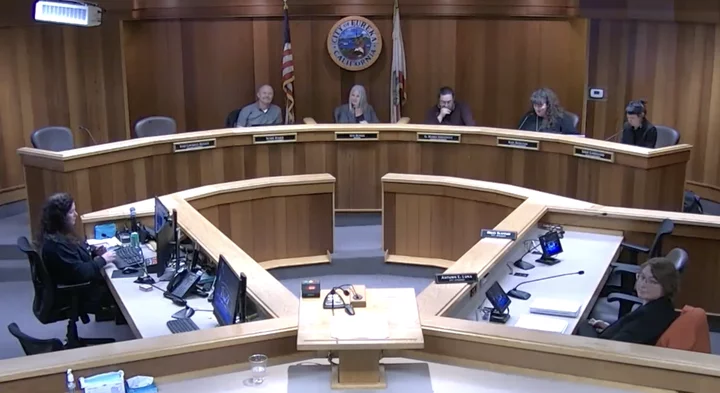
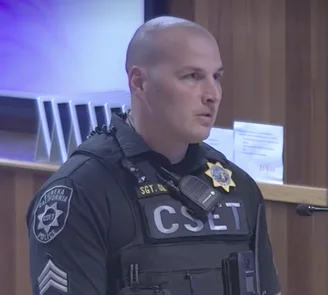
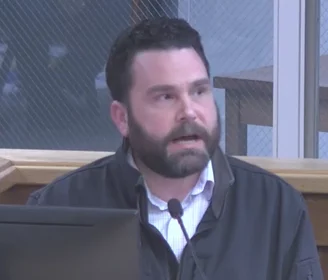
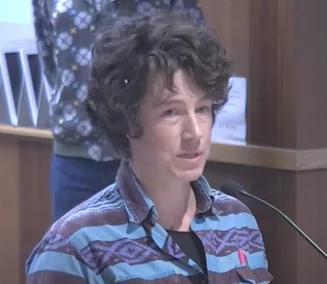
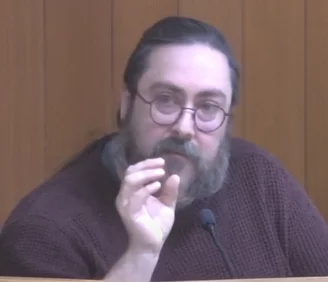
CLICK TO MANAGE